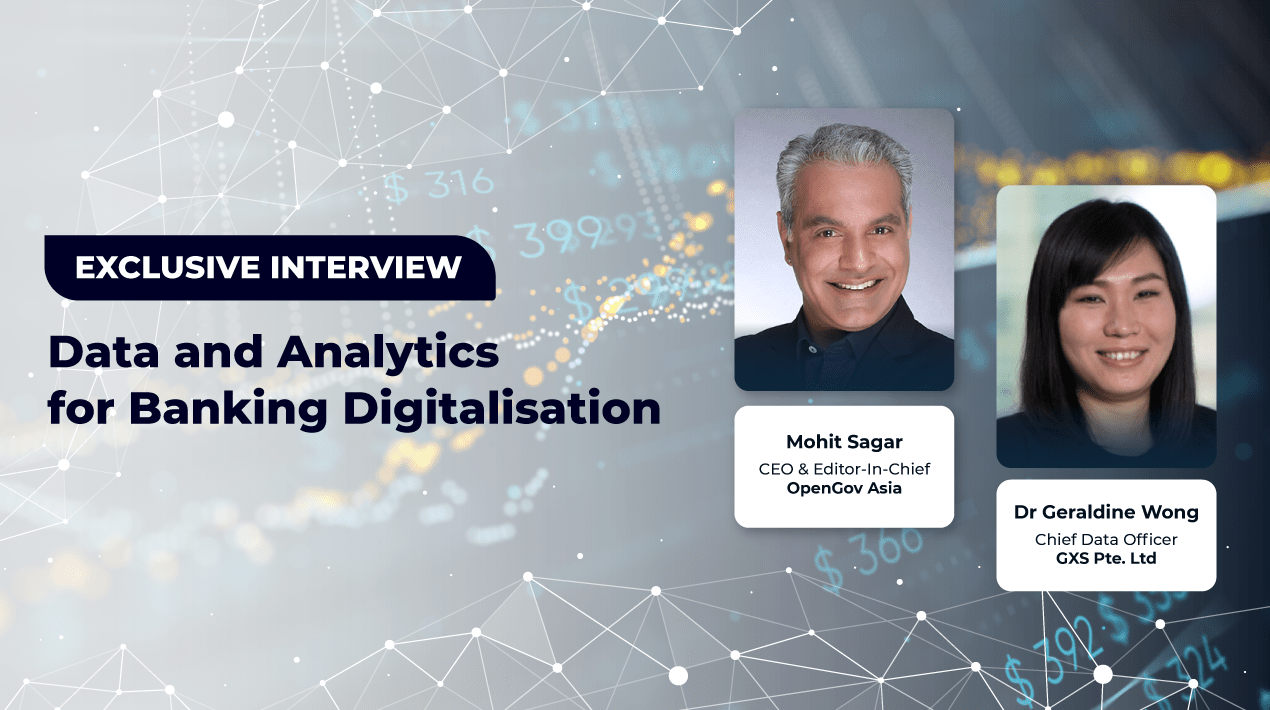
The use of artificial intelligence (AI) has increased rapidly, accelerating during the pandemic. Machine learning, deep learning algorithms and models process massive amounts of data to enable faster, smarter, and better decision-making. As a result, tech-enabled forecasting holds enormous promise for the financial industry which has long been the steward of massive data sets.
Business leaders recognise the importance of data tailored to each function and the role analytics tools play in leveraging data. In this context, data-driven decision-making analytics software inherently provides a competitive advantage.
Advancements in data, analytics and machine learning mean that businesses with large amounts of data have an incredible opportunity to capitalise on it. However, they must do so with an eye toward scale, change management and a curiosity culture.
Data-driven decision making
 Dr Geraldine Wong, Chief Data Officer, GXS, revealed in an exclusive interview with Mohit Sagar, CEO and Editor-in-Chief, OpenGov Asia, that collecting, extracting, structuring and analysing business insights was historically a time-consuming task that slowed data-driven decision-making.
Dr Geraldine Wong, Chief Data Officer, GXS, revealed in an exclusive interview with Mohit Sagar, CEO and Editor-in-Chief, OpenGov Asia, that collecting, extracting, structuring and analysing business insights was historically a time-consuming task that slowed data-driven decision-making.
Dr Geraldine, who is among the 2022 Global Top 100 Innovators in Data and Analytics Today, notes that business intelligence software has since enabled people without significant technical experience to analyse and extract insights from their data. Less technological expertise is needed to provide reports, trends, visualisations, and insights that aid decision-making.
AI technologies such as machine learning and natural language processing are evolving and, when combined with data, analytics and automation can assist organisations in achieving their objectives – whether improving customer service or optimising the supply chain.
Companies should clearly understand what AI means in the business and then recognise how it adds value to the business. The idea of skill set, and multi-cultural definition is significant.
According to Dr Geraldine, everyone can be a data scientist. The major challenge is finding the appropriate fit – the right individuals with the proper skill set – and then keeping them motivated and engaged.
Moreover, having the right set of digital tools to manage data insights content and digital marketing is essential. With this, organisations can create a strategy to engage their target customer segments from the start to the end of their customer journey. For example, companies can harness insights into customer behaviour and patterns, personas, conversion rate optimisation and many more digital metrics essential to anticipating customer needs and offering products and services which are most relevant to them.
“The way you market your products using these digital technologies will boost engagement because it is derived from data-driven insights,” Dr Geraldine believes.
Data privacy and trust concerns could also be a cultural component. Distinct cultures have varied ways of communicating and creating trust, as well as different approaches to cyber security and fraud prevention.
Dr Geraldine feels that it is essential for companies to take seriously their responsibility in protecting data privacy as well as to know how to build and earn the trust of their customers.
As part of the trust and innovation mesh, Dr Geraldine says there are fundamental questions that should be addressed – How do we make information more accessible? How can we make it simple for people to use our app? How do we ensure that our app is intuitive to our customers? She is convinced that companies have a role to play in bringing traditional physical business to a digital space. When integrated into a digital campaign, traditional marketing can reach more people, spread the message faster and increase the return on investment for the campaign.
However, this only happens when different products and services are promoted through a multi-channel approach as part of an integrated marketing strategy. To move prospects down the sales funnel, businesses need to ensure that the conversation with customers remains seamless across multiple communication channels, whether online, offline or both.
Effective data governance
Effective data governance allows business users to make decisions based on high-quality data and well-managed information assets. However, putting in place a data governance framework is not easy. Dr Geraldine strongly believes that data governance should be a priority in both the public and private sectors.
Data ownership issues, data inconsistencies between departments, and the growing collection and utilisation of big data in businesses are all common concerns. Data governance enables processes to run smoothly and reduces mistakes in a database, giving the business a solid place to start. It also saves time and money.
In terms of data governance across the private and public sectors, Dr Geraldine is convinced that it should be planned and organised carefully and intentionally. A successful data governance strategy involves careful preparation, the proper people and the right tools and technologies.
A data governance framework provides industry best practices for managing data governance initiatives and exploring data stewardship. Data quality, privacy, and governance as a means of building trust are consistently recognised as the most significant issues in data management. As the relevance of data democratisation for business transformation grows, so does the number of non-technical data consumers who desire convenient self-service access to data for their use but are ill-equipped to control data properly.
As anticipated, the outcomes of the data governance journey, data quality and privacy are critical to promoting enterprise-wide data literacy to deliver commercial value while maintaining confidence. It is essential to eliminate operational risks and allow individuals to use data responsibly.
Even if increasing the use of AI and automation accelerates the process of creating value, everyone in the organisation must be able to use data the same way. This can benefit the organisation by making data exchange faster, more widespread and more straightforward. Introducing new data sources and information can aid operational reporting and analysis and make data-driven decisions easier.
Modern business requires data literacy
Data literacy is about educating stakeholders about the information available and organising it in a way that makes it easy to identify and consume. When a data governance team acknowledges the importance of data literacy in an organisation’s data governance strategy, the result is a well-defined data catalogue that any staff member can access.
Establishing trust is a holistic endeavour: it is both a leadership and a design issue. It requires both cultural and practical strategies, as well as the engagement of everyone. Without widespread data literacy and clearly defined data terms and frameworks, communication channels can break down, resulting in catastrophic results.
Dr Geraldine highlighted the recently established Digital Trust Centre (DTC) of the Ministry of Communications and Information that could assist the banking industry in gaining consumer trust. However, digital trust must be developed and started within the organisation before it extends to external stakeholders.
Organisations require solid, mutually beneficial partnerships to successfully grow together and exploit new business opportunities to embark on such a remarkable digital journey. Customers may utilise rapid digital innovation to create new business models, enter new markets and accelerate their profitable expansion.
Moreover, alternative data is becoming increasingly popular in Singapore. Dr Geraldine is excited about the use of securely shared data to make financial services more available to a broader range of customers.
With developing technology, the banking industry may enhance its usage of alternative data protection in five years.
In addition to the ethical and responsible use of AI, another data trend that Dr Geraldine is expecting in the next two to four years is an increase in the number of organisations that will be doubling down on using data to build customer engagement models and within their ecosystems. “What will be interesting to see is how this translates into better customer experience and how companies ensure stringent data protection.”
Given the positive attitude that nations across the world have to technology and the plethora of digital initiatives being put in place to better the citizen experience, Dr Geraldine is optimistic about the future of data governance and the opportunity to use data in a secure manner to improve customer experiences.
















